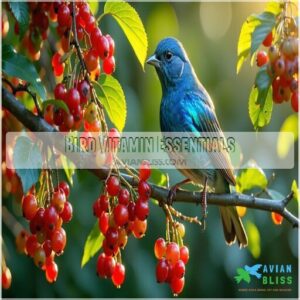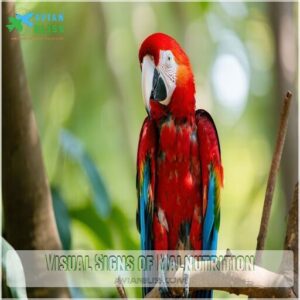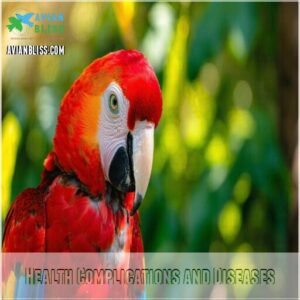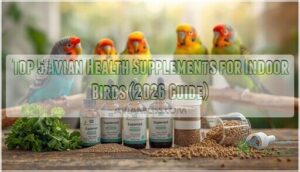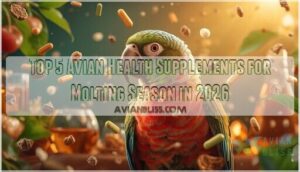This site is supported by our readers. We may earn a commission, at no cost to you, if you purchase through links.
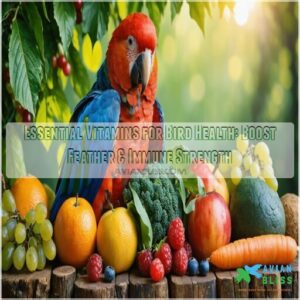 Your bird needs the right mix of essential vitamins for health and happiness.
Your bird needs the right mix of essential vitamins for health and happiness.
Vitamin A keeps their vision sharp and feathers vibrant. Vitamin D helps build strong bones, especially for indoor birds. Vitamin E acts as an antioxidant, protecting their cells and boosting feather strength. Vitamin K supports blood clotting to keep injuries in check.
Don’t forget the B vitamins for energy, metabolism, and healthy feather growth. Signs of a deficiency might show up as dull feathers or low energy.
Offering pelleted diets and fresh foods can help. Want to know the best foods or tips to avoid over-supplementing? Stay tuned for more information on maintaining your bird’s happiness.
Table Of Contents
- Key Takeaways
- Bird Vitamin Essentials
- Recognizing Vitamin Deficiencies
- Role of Vitamins in Health
- Essential Vitamins for Feathers
- Balancing Vitamin Diet
- Frequently Asked Questions (FAQs)
- What are essential bird vitamins?
- What is the most common vitamin deficiency in birds?
- What is the bird’s best multivitamin?
- What are the daily essentials for birds?
- Why do birds need vitamins?
- Why do birds need feather vitamins?
- What are the best supplements for birds?
- What nutrients do birds need?
- What are the most important vitamins for birds?
- How can over-supplementing vitamins harm birds?
- Conclusion
Key Takeaways
- Your bird needs vitamins A, D, E, and K for vision, bone strength, cell protection, and blood clotting—signs of deficiency include dull feathers, low energy, and behavioral changes.
- You’ll support feather health by providing vitamin A for pigmentation, vitamin E for strength and integrity, and B-complex vitamins for proper growth and development.
- You can ensure balanced nutrition through pelleted diets and fresh foods like leafy greens, carrots, and sweet potatoes that naturally contain essential vitamins.
- You shouldn’t over-supplement as it can lead to toxicity—follow dosage guidelines carefully and consult with an avian veterinarian before adding supplements to your bird’s diet.
Bird Vitamin Essentials
You need to give your bird the right vitamins to keep it healthy and full of energy. Each vitamin plays a role in supporting vision, bones, feathers, and overall wellness.
Vitamin a for Vision
Vitamin A is essential for your bird’s eye health.
Vitamin A keeps your bird’s eyes sharp and healthy, preventing night blindness and supporting clear vision with balanced nutrition.
It prevents night blindness and supports clear vision. Retinol sources like carrots and sweet potatoes boost avian health.
Look for bird vitamins to avoid vitamin deficiency. Watch for deficiency symptoms like squinting or dull eyes.
Follow dosage guidelines carefully to maintain balanced bird nutrition, ensuring their eyes stay sharp and healthy.
Vitamin D for Bone Health
Strong bones need more than just calcium for birds.
Indoor birds miss natural sunlight exposure, leading to vitamin D deficiency. Without it, calcium absorption drops, causing issues like weak bones, poor eggshell quality, or even rickets.
To boost bone health, make certain your bird’s diet includes vitamin D or consider sunlight alternatives like UV lamps.
Keep their bones sturdy and healthy!
Vitamin E for Antioxidant Properties
Unlike vitamin D’s focus on bones, vitamin E works behind the scenes as an antioxidant.
It shields cells from damage, protects your bird’s neuromuscular function, and supports reproduction.
Without enough, birds may show weakness or poor fertility.
Adding bird vitamins sourced from leafy greens or specific vitamin supplements helps maintain cellular protection and overall bird health effectively, which is crucial for supporting reproduction and neuromuscular function.
Vitamin K for Blood Clotting
Strong feathers need more than Vitamin E.
Vitamin K supports bird health by ensuring proper blood clotting, and it plays a role in bone metabolism and liver health, too.
A K deficiency can lead to bleeding issues and weaker bones.
One way to avoid deficiencies is through varied diets.
Adding bird vitamins from trusted supplement sources or vitamin-rich foods keeps clotting factors balanced, promoting healthy birds and overall well-being.
Recognizing Vitamin Deficiencies
You can often spot vitamin deficiencies in birds by watching for changes in their appearance or behavior. Knowing these signs helps you keep your bird healthy and happy.
Visual Signs of Malnutrition
Nutritional deficiencies show up in your bird’s appearance.
Feather abnormalities like scruffy or brittle feathers may point to bird vitamin deficiencies.
Beak deformities, skin lesions, and muscle wasting signal malnutrition.
Weight changes can hint at health issues, and vitamin A or D deficiency often worsens these signs.
Regular checks are essential for bird health to catch these early.
Behavioral Changes in Birds
Your bird’s behavior can hint at vitamin deficiencies.
Look for stress indicators like feather plucking or changes in social interaction. Nutritional deficiencies might cause cognitive decline or unusual aggression.
A poor diet or imbalanced vitamins impacts bird health and behavior. An avian veterinarian can help assess dietary impact and recommend solutions to improve your bird’s well-being and happiness.
Health Complications and Diseases
Bird vitamin deficiencies can lead to serious bird health problems.
Vitamin A deficiency causes thick skin and poor immunity.
Vitamin D deficiency weakens bones, while low vitamin E harms muscles and nerves.
Nutritional imbalances also trigger immune disorders.
Watch for deficiency symptoms like flaky skin or weakened feathers.
Balanced diets prevent organ health issues, reducing genetic predisposition risks.
Avoid over-supplementing.
Respiratory distress can indicate potential iodine deficiency, which may lead to further complications if not addressed properly, emphasizing the importance of a balanced diet.
Role of Vitamins in Health
Vitamins are essential for your bird’s growth, energy, and immune health. They support key functions that keep your bird active and thriving every day.
Growth and Development
Young birds need proper nutrients to grow strong.
Vitamins like D, along with calcium and phosphorus, build solid bones. Amino acids are essential for muscle growth and organ development.
Healthy metabolism fuels Chick Development while supporting overall bird growth and development.
A well-balanced diet guarantees proper Bone Formation, helping your feathered friend thrive. It’s the foundation for lifelong health.
Energy Production and Metabolism
Energy powers birds’ daily activities, and vitamins play a key role in metabolism.
The B-Vitamin Complex supports bird metabolic health by aiding enzyme activation and cellular respiration. It guarantees metabolic pathways run smoothly. Balanced avian nutrition matters here.
- B-Complex vitamins fuel energy release
- Enzymes rely on vitamins to function
- Supports healthy cellular respiration
- Prevents sluggish metabolism
- Dietary impact boosts energy
Immune System Support
A strong bird immune system keeps your feathered friend healthy and happy.
Bird vitamins like Vitamin E give an antioxidant boost, protecting cells from damage.
Vitamin A improves gut health, aiding natural immunity.
Stress reduction is key too, as it prevents weakening.
Avian nutrition and bird health supplements help white blood cells work better, ensuring robust bird immune support.
Owners should also be aware that arthritis affects birds, potentially weakening their immune response to require natural immunity and good avian nutrition.
Essential Vitamins for Feathers
Feathers do more than make your bird look good; they protect and help with flight. Giving essential vitamins like A, E, and B supports strong, healthy feathers.
Vitamin a for Feather Pigmentation
Vitamin A supports feather pigmentation and healthy skin in birds.
It aids pigment synthesis and enhances feather coloration. Poor diets can lead to dull feathers or brittle breaks.
Boost their glow with proper bird vitamins.
- Helps maintain vibrant feather coloration
- Assists carotenoid pigment synthesis
- Prevents brittle and dull feathers
- Supports feather health and bird health
- Found in fresh foods and bird supplements
Vitamin E for Feather Integrity
Vitamin E protects feathers as an antioxidant, keeping them strong and smooth.
Vitamin E acts as a shield, enhancing feather strength, preventing damage, and ensuring a smooth, vibrant plumage for your bird.
It stops damage from toxins and supports healthy feather structure.
An E deficiency can lead to fraying or dull feathers, affecting your bird’s look and health.
Bird supplements with vitamin E, like oils or enriched foods, are great sources, essential for breeding impact and pet bird health.
Vitamin B for Feather Growth
Vitamin B-complex plays a big role in feather growth.
Biotin supports strong feathers, Niacin boosts healthy skin underneath, and Riboflavin keeps feather structure intact.
Without these, you’ll notice dull feathers or shedding—clear deficiency symptoms.
Meeting avian dietary needs with bird vitamins guarantees proper bird nutrition solutions.
Include B-complex in diets to support vibrant, healthy plumage effortlessly, ensuring healthy skin.
Balancing Vitamin Diet
Providing your bird with a balanced vitamin diet keeps them healthy and active. Focus on feeding pelleted diets, fresh foods, and using supplements carefully to avoid problems.
Pelleted Diets for Birds
A pelleted diet is a game-changer for your bird’s nutrition essentials. Pellets guarantee a balanced diet, meeting avian dietary needs.
They simplify feeding while preventing picky eating. You can easily find a suitable pelleted food online for your bird.
- Pellet Benefits: Packed with essential vitamins and minerals.
- Converting Birds: Gradual introduction minimizes stress.
- Pellet Variety: Available for different bird species.
- Storage Guidelines: Keep dry to preserve quality.
Fresh Foods for Vitamin Variety
Fresh foods are a great way to give birds a variety of vitamins like vitamin E, vitamin C, and B-complex vitamins.
Offer safe produce, organic options, and sprouted seeds for the best nutrition. Seasonal variety keeps meals interesting, too.
Proper food preparation guarantees safety. Fresh foods can even help with folic acid needs and boost vitamin D levels naturally.
For peak health, include leafy greens like kale and spinach, which provide essential nutrients and support overall well-being with natural benefits.
Avoiding Over-Supplementation
Over-supplementation can harm your bird’s health.
Use water-soluble vitamins and mineral supplements carefully.
Follow dosage guidelines to avoid toxicity symptoms like liver issues.
Monitor your bird’s diet and consult a vet before adding anything.
Vitamin D deficiency? Try natural alternatives like cuttlebones.
Remember, vitamin E and other nutrients are better from food.
Be aware of potential bird vitamin overdose.
Keep the balance—more isn’t always better, especially with vitamin supplements, and be cautious of overdose.
Frequently Asked Questions (FAQs)
What are essential bird vitamins?
Think of a balanced diet as your bird’s flight plan to health.
Birds need Vitamins A, D, E, B-complex, and K for growth, immunity, and energy.
Always provide species-specific supplements under your vet’s guidance.
What is the most common vitamin deficiency in birds?
Vitamin A deficiency is the most common in birds.
It affects the immune system, skin, and feathers.
You might notice issues like respiratory infections or poor feather quality.
A balanced diet helps prevent this.
What is the bird’s best multivitamin?
Imagine your bird thriving like a blooming tree—Daily Essentials 3 is a top pick.
It provides 13 vitamins, 9 minerals, and amino acids, ensuring balanced nutrition.
Mix it with soft food for best results!
What are the daily essentials for birds?
Your birds need Daily Essentials vitamins with minerals and amino acids.
Add them to food or water.
Don’t forget calcium, vitamin A, D, and E.
Fresh fruits and veggies help too.
Why do birds need vitamins?
While wild birds get nutrients naturally, your feathered friends need vitamins to support their immune system, maintain healthy feathers, strengthen bones, and boost energy.
They can’t thrive without these essential building blocks.
Why do birds need feather vitamins?
Your feathered friends need specific vitamins for healthy plumage growth. They help maintain feather structure, color, and waterproofing. Without them, birds can’t fly properly or stay warm and protected.
What are the best supplements for birds?
Seeking the gold standard for your feathered friend? Your bird needs Nekton-Fly or Vitapreen for essential multivitamins. Don’t forget supplements with Vitamins A, D, E and calcium for peak health.
What nutrients do birds need?
Your feathered friends need vitamins A, D, E, K, and C, plus B-complex vitamins for energy.
They also require minerals like calcium, phosphorus, iron, iodine, zinc, magnesium, selenium, and manganese for peak health.
What are the most important vitamins for birds?
Picture your feathered friend thriving with vibrant plumage.
You’ll need to provide Vitamin A for immunity, Vitamin D for bones, Vitamin E as an antioxidant, and B vitamins for energy and nerve function.
How can over-supplementing vitamins harm birds?
Over-supplementing vitamins can cause toxicity in your birds. Too much vitamin A damages internal organs. Excess vitamin D leads to calcium deposits. Overdosing water-soluble vitamins stresses kidneys and causes hypervitaminosis.
Conclusion
Where would your feathered friend be without essential vitamins for bird health?
By providing a balanced diet of pelleted food and fresh fruits, you’ll boost their immune system and keep those feathers bright.
Watch for signs of deficiency like dull plumage or lethargy. Don’t overdo supplements—too much can be as harmful as too little.
Your bird’s vibrant health depends on these essential nutrients, so make smart dietary choices daily to ensure they receive the necessary balanced diet.

